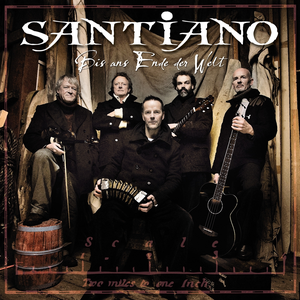The producer and owner of the label Elephant Music Hartmut Krech from Flensburg came up with the idea for the band. On February 3rd 2012 they released their first CD "Bis ans Ende der Welt" (Until the end of the world) on "We Love Music", a cooperation of Universal Music and ProSiebenSat.1 Media. Their album has sold more than 100.000 times and has gold status in Germany.
In 2012 they played at world famous metal festival "Wacken Open Air" among several metal bands like In Flames, The Scorpions, Ensiferum or Amon Amarth.
Members:
Hans-Timm Hinrichsen - Vocals, Guitar, Bass, Drums
Axel Stosberg - Vocals, Harp, Percussion
Björn Both - Vocals, Guitar, Bass
Andreas Fahnert - Vocals, Guitar
Pete Sage - Violin, Mandolin, Vocals, Accordion, Bouzouki, Percussion, Tin Whistle
Homepage
Alle die mit uns auf Kaperfahrt fahren
Santiano Lyrics
Jump to: Overall Meaning ↴ Line by Line Meaning ↴
Alle die mit uns auf Kaperfahrt fahren, müssen Männer mit Bärten sein
Jan und Hein und Klaas und Pit,
Die haben Bärte, Die haben Bärte
Jan und Hein und Klaas und Pit,
Die haben Bärte, die fahren mit
Alle die Weiber und Branntwein lieben, müssen Männer mit Bärten sein
Jan und Hein und Klaas und Pit,
Die haben Bärte, Die haben Bärte
Jan und Hein und Klaas und Pit,
Die haben Bärte, die fahren mit
Alle die Tot und Teufel nicht fürchten, müssen Männer mit Bärten sein
Alle die Tot und Teufel nicht fürchten, müssen Männer mit Bärten sein
Jan und Hein und Klaas und Pit,
Die haben Bärte, Die haben Bärte
Jan und Hein und Klaas und Pit,
Die haben Bärte, die fahren mit
Alle die mit uns auf Kaperfahrt fahren, müssen Männer mit Bärten sein
Alle die mit uns auf Kaperfahrt fahren, müssen Männer mit Bärten sein
Jan und Hein und Klaas und Pit,
Die haben Bärte, Die haben Bärte
Jan und Hein und Klaas und Pit,
Die haben Bärte, die fahren mit
"Alle die mit uns auf Kaperfahrt fahren" is a German folk song that celebrates the romanticized image of free-spirited pirates. The song seems to suggest that the most important qualification for joining a pirate crew is having a beard, but it also highlights traits like courage and a love of adventure. The lyrics repeat the names of four men (Jan, Hein, Klaas, and Pit) who have beards and will be going on the pirate journey. The song's repetitive cadence and catchy melody make it a popular drinking song, especially in German folk festivals and pubs.
The song's origins are unclear, and it's possible that it evolved over time through various regional versions of the chant. The earliest printed version dates back to 1830, and it's believed to have originated in the lowlands of northern Germany or the Netherlands. Some theories suggest that the song may have been inspired by the privateers of the Hanseatic League, a group of trading towns in medieval northern Europe that established their own naval forces to protect their interests.
The song has remained popular in German-speaking countries for over a century, and there have been numerous adaptations, variations, and parodies of the lyrics. Despite its association with the romanticized image of piracy, the song's message can also be interpreted as a tribute to the rebellious spirit of the common people who defied the authority of the ruling class. The song's simple message and catchy melody have made it a favorite among many different subcultures, from soldiers to sports fans.
Line by Line Meaning
Alle die mit uns auf Kaperfahrt fahren, müssen Männer mit Bärten sein
Only men with beards are allowed to join us on our pirate voyage
Jan und Hein und Klaas und Pit, Die haben Bärte, Die haben Bärte
Jan, Hein, Klaas, and Pit are the specific men with beards who will be sailing with us
Alle die Weiber und Branntwein lieben, müssen Männer mit Bärten sein
Even women who love alcohol must abide by the rule that only men with beards can come with us
Alle die Tot und Teufel nicht fürchten, müssen Männer mit Bärten sein
Those who are not afraid of death and the devil must still comply with the requirement of having a beard in order to join us
Lyrics © Sony/ATV Music Publishing LLC
Written by: Hartmut Krech, Mark Nissen
Lyrics Licensed & Provided by LyricFind
